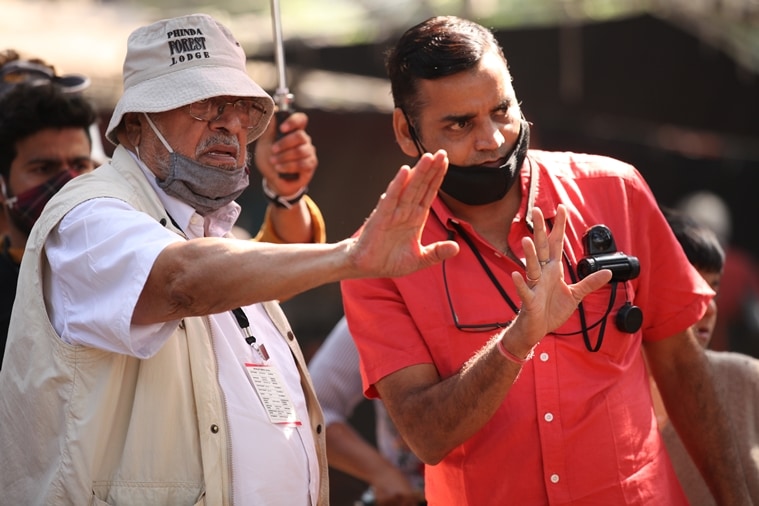Shyam Benegal was more than a filmmaker. He was a chronicler of Indian life. A pioneer of parallel cinema, Benegal crafted stories that unflinchingly explored class, caste, gender, and identity. His films transcended the boundaries of art and commercial cinema, engaging both connoisseurs of meaningful cinema and general audiences alike.
From his early masterpieces like ‘Ankur’ (1974) and ‘Nishant’ (1975) to the poignant Muslim Women Trilogy (Mammo, Sardari Begum, and Zubeidaa’), Benegal’s works reflected an India that was complex, conflicted, and deeply human. He turned the camera into a mirror, showing not just the world as it was, but the world as it could be.
The Hyderabadi who stayed grounded
Born on December 14, 1934, in Alwal, Hyderabad, Benegal’s early years were shaped by the cultural richness of his hometown. His father, Sridhar B. Benegal, was a prominent photographer who ran a studio in Lalbazar, not too far from their family home in Alwal, which now stands in disrepair. Despite his global fame, Benegal never forgot his roots. He often attributed his storytelling ethos to the vibrant and diverse milieu he grew up in.
‘My stories are from the streets I walked, the faces I knew, and the lives I observed,’ Benegal once reflected. This connection to his heritage gave his films a sense of authenticity that resonated deeply with audiences.
A champion of film culture
Benegal’s contribution to Indian cinema extended beyond filmmaking. In his formative years, Hyderabad was home to a growing community of cinephiles, and Benegal played a significant role in nurturing this culture. His works inspired many film clubs and societies in the city that showcased meaningful films and sparked discussions on cinema as an art form.

Through his storytelling, Benegal elevated the appreciation of cinema to a cultural movement, encouraging audiences to see films not just as entertainment but as a reflection of society. He believed in cinema’s ability to provoke thought and foster dialogue, making him a catalyst for film appreciation in India.
A philosophy of collaboration
Benegal’s success was rooted in his belief that cinema was a collaborative art form. He surrounded himself with gifted writers like Shama Zaidi and Girish Karnad and nurtured talents like Shabana Azmi, Smita Patil, Om Puri, and Naseeruddin Shah, who went on to become stalwarts of Indian cinema. His long-standing partnership with cinematographer Govind Nihalani not only brought visual brilliance to his films but also inspired Nihalani to become a celebrated filmmaker in his own right.
For Benegal, filmmaking was not about dictating a vision but about fostering a shared purpose. ‘Everyone on a set has a story to tell; my job is to weave those stories together into something meaningful,’ he said in one of his interviews.
Storyteller and educator
As the director of the Film and Television Institute of India (FTII), Benegal played a pivotal role in shaping the future of Indian cinema. He believed that good cinema was an extension of good storytelling, and he encouraged students to explore narratives that mattered. His influence extended beyond the classroom, through his own films and his mentorship of emerging filmmakers.
Benegal’s passion for education was most evident in his iconic television series ‘Bharat Ek Khoj’, which brought Jawaharlal Nehru’s ‘Discovery of India’ to life. Through this series, he introduced a generation of viewers to India’s vast history and cultural heritage, emphasizing that the past is as important in shaping the present as it is in understanding it.
Cinema as a moral compass
Benegal’s works were driven by a deep sense of morality and justice. Whether it was addressing caste exploitation in ‘Ankur’, exploring gender dynamics in ‘Bhumika’, or spotlighting grassroots movements in ‘Manyhan, he used his films to give voice to the marginalised and provoke meaningful dialogue. ‘I don’t make films to provide answers; I make them to raise questions,’ he once said. This philosophy underpinned his storytelling, earning him respect as a filmmaker who never compromised on his principles.
A legacy that lives on
Shyam Benegal passed away on December 23, 2024, in Mumbai, leaving behind a legacy that is as vast as it is profound. Over his illustrious career, he received 18 National Film Awards, the Dadasaheb Phalke Award, and numerous other accolades. Yet, he remained unassuming, viewing awards as milestones rather than destinations.
While his death marks the end of an era, his films and philosophy will continue to inspire generations of storytellers and audiences alike. His life was a testament to the power of cinema to reflect, challenge, and transform society — a legacy that will remain etched in the annals of Indian cinema.




